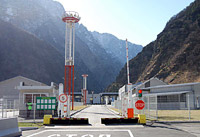After being closed for four years, the Upper Lars checkpoint on the Russian-Georgian border is again open. Starting from yesterday people have started to speak that the opening of the checkpoint will temper the inflation in Armenia because transport costs will reduce to a certain extent.
We will come back to transport expenses and their possible reduction. Prior to that, let’s speak about the inflation. People are in quite a big panic, which is connected with the possible jump of prices in the country. The concern is not ungrounded and is basically connected with the increase of the gas price is probably the best evidence of that. Besides that during the past several days the USD is shifting up. As a result of this the price of imported goods will inevitably increase. The international organizations and RA officials also think that the inflation will exceed the expected rates. During its February 16 session the CB board made a gloomy prediction. “Increased international prices of raw materials and basic food products, as well as gradual recovery of aggregate demand owing to expansionary fiscal policy make current inflationary environment to persist. Though in the forecast 12-month horizon inflation will exceed the target band, determined by the previous year’s inflation developments, it will somewhat step down from its peak to be recorded in the first quarter of 2010,” reads the CB statement. Days ago the director of the Armenian branch of the World Bank Aristomene Varudakis also spoke to this issue. The CB, the World Bank and all the other international structures are trying to give an “optimistic tint.” They are saying that the inflation pressures are stipulated with the motives of recovery of the global economy. So the inflation is the price we should pay to overcome the global crisis. The Central Bank is also speaking of the overcoming of the domestic crisis. “The behavior of the inflation was conditioned within the motives of recover of the economy and the inflation pressures. By looking to tighten the monetary policy conditions gradually under the mentioned inflation trends, the Board aims to scale back deviation of inflation from the target in the forecast time horizon.” According to official statistics inflation in January 2010 was around 1.7%, while the 12-month inflation reached to 7%, exceeding the upper border of the target band by 1.5%. And so the Central Bank has decided to prevent this by restricting the monetary policy and by increasing the interest rate of re-financing by 6%. In other words, they are conducting an expensive money policy. Time will show how these levers of expensive money policy will affect the inflation rates. But the opening of the Upper Lars, many people consider a more serious factor than re-financing. And to what extent is the Upper Lars important for us and what impact will have on our economy? Indeed, the influence will be positive but we shouldn’t overestimate it. The reason is that via the Upper Lars it is not allowed to import goods taxed with excise stamp taxes. The director of Apaven company in charge of cargo transportation Gagik Aghajanyan told us checkpoints usually have the license to permit to transport excise goods but the Upper Lars has been long ago deprived of this license. It means that in the aspect of transport costs there will change not only for all the goods. As of the reduction of goods then this won’t be essential either. In the words of Aghajanyan if for one container the cost of transportation from Yerevan to Moscow costs 4500-5000 USD (by ferryboat from Poti port to Novorosiysk) then if transported via the Upper Lars this amount will reduce to 3500-4000 USD. Taking into account that in the event of importation and exportation the costs make 10-15% we may presume that the cost of the imported goods will reduce by maximum 3-4% and this is not for all the goods. But G. Aghajanyan advises to review the issue not only in the aspect of prices but also time. “It is very important that after the opening of the Upper Lars we will not be depending on the ferryboat. It departs once 7-8 days and we have to adjust the schedule of our transpiration with their schedule,” says Aghajanyan. Besides 7-8 days intervals the ferryboat has another defect – the way gets longer. “When it departs from Novorosiysk it sails to Burgas and than to Poti. So the distance it may cross within 24 hours it does within 5 days,” says Aghajanyan. And for a businessman the loss of at least one day harms the business. In the words of the director of Apaven the reduction of the time needed for transportation is mostly beneficial to the agriculture. In the seasonal aspect the Upper Lars is available to the exporters of agricultural goods (it operates from spring till fall). And in this case the short time needed for transportation is very important because we get to deal with products having a big threat for being spoilt. “There is another important factor. Both the Russian and Georgian sides have adjusted the checkpoint to the highest standards. So it will be possible to avoid the previous semi-criminal system,” says Aghajanyan. In a word, the opening of the Upper Lars is useful for our economy. Indeed, many people see a political or geopolitical context behind this initiative but this is a different theme for discussion. Let us also mention that only transport means can cross the Upper Lars. There is no access for the pedestrians or the residents of the area to cross the checkpoint. The citizens of Russia or Georgia, who’d wish to cross the Upper Lars border will have to get permissions from the Swiss Embassy because Switzerland has taken up the role of the mediator between these countries ever since the conflict.

